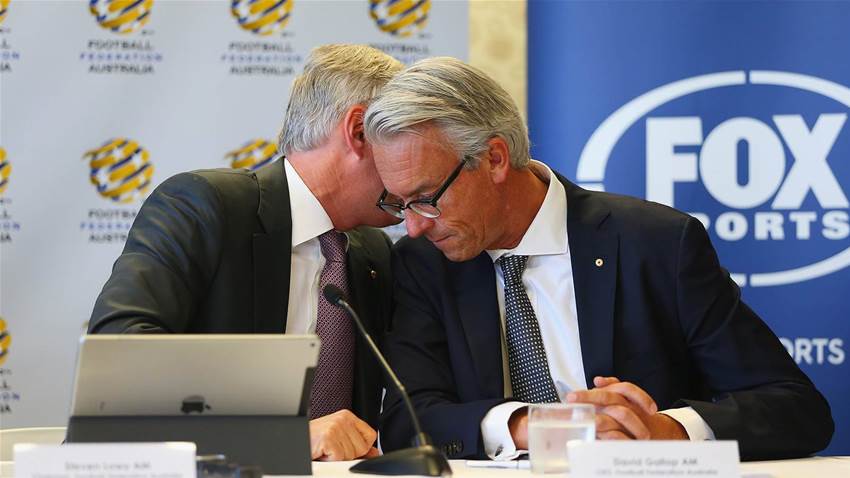The Congress Review Working Group has unloaded on Football Federation Australia's attack on their report to FIFA and hit back at every point the FFA raised.
In a lengthy six page memo published today, the CRWG – set up at FIFA's request to overhaul the way the FFA is run – dismantled all of the FFA's arguments against their report made public last week.
The six month inquiry by the CRWG, chaired by Judith Griggs, laid out a list of major changes to the way football in Australia should be governed.
As well as spinning off the A-League into its own organisation for 2019/20, it also proposed giving seats on the FFA Congress to players and clubs as well as state federations.
And it also opened the door for more seats on the congress further down the line for fans and NPL clubs as well as other special interest groups.
But the FFA dismissed many of the key proposals in the report, claiming it favours professional football over grassroots football.
Today the CRWG hit back at that suggestion and said their specific mandate from FIFA was to make sure no stakeholder group had a controlling interest, especially when it came to electing directors to the FFA board.
"For the first time in Australian football, the report recommends an enhanced direct input through representatives of grassroots and community football providing advice directly to the FFA"
"This assertion is without merit and without substance," says the CRWG statement today.
"The CRWG was tasked with establishing a more representative and balanced Congress for Australian football.
"This included the need to embrace existing (including member federations, A and W League clubs, and players) and future (women’s football, NPL clubs, coaches, referees, futsal, fans and the like) stakeholders who previously have not had a voice or vote in the leadership of Australian football."
FFA Statutes require 60% of Congress backing to elect a director, and to prevent any one faction dominating voting, the CRWG's plan pulled state federations' vote share back from its current 90% to a proposed 55%.
"As such, the CRWG provides and recommends for the existing grassroots representatives to retain more than a simple majority of Australian football's Congress," said the CRWG statement.
"For the first time in Australian football, the report recommends an enhanced direct input through representatives of grassroots and community football participating in the Grassroots and Community Football Committee, which provides advice directly to the board and management. of FFA."
The FFA also claimed the new system would allow A-League clubs to boot as a block and veto changes to the FFA Constitution.
The CRWG dismissed that claim too and said under their plan, vetos needed more than 25% support from Congress and the backing of two or more separate stakeholder groups.
Any special resolution would also need to be discussed by all stakeholders and supported before it went before a general meeting.
The FFA also claimed the players union, PFA, would have a disproportionate share of the vote compared to each state federation.
But that was in direct contrast to the FFA's own proposed model which also gave the PFA seven votes, says the CRWG.
"Reassuringly, the system of decision-making recommended in the CRWG Report is established as a demonstration of strong governance and transparency and supported by the FIFA Statutes."
The FFA also took issue with the proposed Women's Council which they claimed would be used by other stakeholders rather than benefiting the women's side of the sport.
The CRWG countered that accusation by saying it was vital to have a women's council with an independent chair and 10% of the Congress vote, giving it a larger say than any other single stakeholder... but that each member of the women's council could still vote individually on any matter.
The FFA also said the CRWG report didn't go far enough in broadening the FFA board and wanted to see a spot for the NPL clubs pressure group the AAFC.
The CRWG hit back by saying the FFA has repeatedly refused to consider or invite ANY new voting members or stakeholders, right up to November last year when FIFA stepped in as a result.
The statement added that they were creating a multi-year pathway for new representatives to take a seat at the table by proving their "institutional integrity" as many didn't even exist at the moment or had only just been created.
The FFA also rejected the move to allow the A-League to set up by itself and said it blurred the lines of the FFA board and its congress.
But the CRWG admits the model proposed gives Congress the final say on a new A-League, deliberately taking it out of the hands of just the FFA board and management "to protect the rights of and the relationship to the grassroots," said today's statement.
It adds: "Reassuringly, the system of decision-making recommended in the CRWG Report is established as a demonstration of strong governance and transparency and supported by the FIFA Statutes."
Related Articles

Socceroo-in-waiting seals Championship deal

Fringe Socceroo swerves A-League to remain in Europe after Fulham exit













